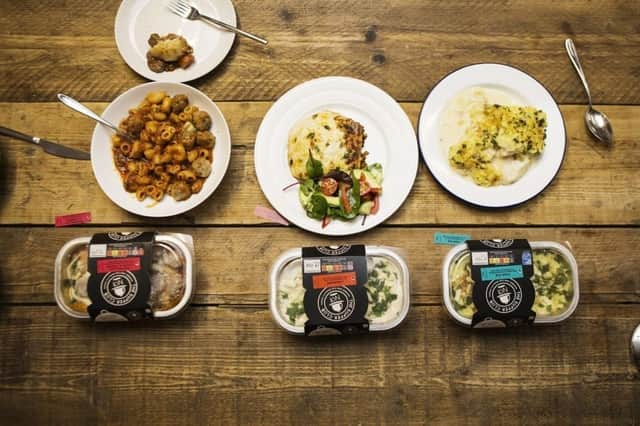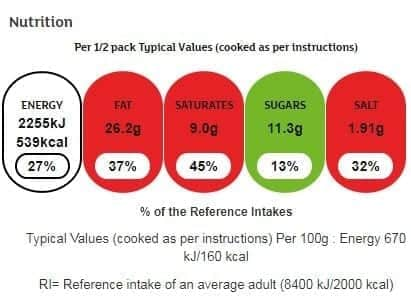Ready meals are not always as bad as we think they are


We might not be proud of it, but in Britain we all eat one ready meal every week on average – twice as many as the French and six times as many as the Spanish. In fact, nearly half of all the ready meals eaten in Europe are consumed in the UK.
In the face of frequent news studies warning that we should cut down on the amount of processed food we eat over dietary concerns and links to increased cancer risk, manufacturers have been forced to look closely at nutritional content, taking action to reduce salts, sugars and saturated fats.


We’re picking premium
Advertisement
Hide AdAdvertisement
Hide AdBut they must also try to keep them as tasty as possible – especially for more discerning diners who may want convenience but not at the expense of quality. Instead of opting for a cheap frozen choice, many consumers are picking “premium” chilled dishes, according to research by The Grocer.
That creates a challenge for people such as Austin Wheeler, the product developer behind Sainsbury’s latest ready-meal range, the Supper Club. “We saw quite a big growth coming from people wanting great-quality meals,” he says. “Another growth was the negativity towards ready meals and how we would break that. We saw that as a big opportunity.”
Vintage cheddar and fine wine


Wheeler and his team came up with a range of six meals based on people’s traditional favourites – including beef stew and dumplings and meatballs and pasta – using higher quality ingredients such as Italian Montepulciano red wine and freshly made pasta in the lasagne, and award-winning Barber’s vintage cheddar in the mac and cheese.
They’re also designed to be “reassuringly imperfect”, he says, to get away from the processed feel. That means a fish pie with mashed potato that is forked by hand, not piped by a machine and big chunky croutons on the mac and cheese.
Curry in a hurry
The team show me how to make its red Thai curry – chopping, dicing, layering and cooking, using what I’m assured is exactly the same method in Sainsbury’s production kitchen.


That’s all well and good, you might say, but what about the meals we already pick off the supermarket shelves? You could be forgiven for wondering what additives are included to guarantee freshness and shelf life. But Wheeler insists there is no “trick or secret” beyond using the best possible ingredients and optimum production methods.
Their meals are cooked so that they reach a core temperature of at least 70°C throughout for two minutes, then transferred to a separate area where they are packed, sealed and stored in a fridge at 5°C before being distributed to stores.
Some ready meals are healthier than others
“There’s a bit of a misnomer around the ready meal,” Wheeler argues. “It is a fallacy that these are unhealthy dishes.” Like most food packaging, the Supper Club uses the traffic light system to show you exactly what you’re eating – and though they are not all greens, they are still healthier than many other premium ready meals. “We wanted to offer authenticity,” Wheeler says. “For example we use a mature cheddar rather than a mild one, which means the recipe doesn’t require as much but still delivers on flavour.”
Advertisement
Hide AdAdvertisement
Hide Ad

Nicola Temple, the author of Best Before: The Evolution and Future of Processed Food, agrees we should not view all ready meals in the same light, nor think that making a dish ourselves is automatically better. Some ready meals deliver way more than the recommended daily allowance of calories, she says – but so too do plenty of our home-cooked meals.
“It’s just the same as if you’re cooking something from scratch – not all recipes in a recipe book are going to be healthy. If you’re going to choose ready meals, you should be as discerning as in choosing any other food. You can’t just expect it to be a perfectly balanced meal, you need to look and make sure it contains what you want. For example, you wouldn’t expect a mac and cheese meal to provide you with your daily greens.”
Not all bad
That responsibility applies to choosing which ready meals you eat as well as how often you eat them, says Helen Bond of the British Dietetic Association. “They are not all bad, but you have to be mindful of what you’re choosing and know how that meal fits within your calorie allowance for the day, or whether or not you can use a ready meal once in a while and add to it. You have got to become a bit of a detective really, knowing what’s high in fat, what’s high in sugars, and what’s high in salt, choosing healthier ones if possible.”
She argues it is “always better to cook from scratch”, but says ready meals “do have a role to play and there have been real advances to improve the nutritional content. I think the problem is that when people rely on them constantly, they lose touch with home cooking.”
Can cook, won’t cook


Is it still generally a case of can’t cook, won’t cook? Temple thinks that cries of “I don’t have time” are often an easy get-out. “We all love to talk about how busy we are,” she says. “But if you look at how much time people spend on social media and watching TV, I think we need to be realistic about how we use our time. That means saying not necessarily ‘We are too busy to cook’, but ‘We would prefer not to cook’.”
Wheeler, meanwhile, isn’t giving up. He’s already thinking of ways he could expand his new range and is on a mission to help get rid of the negative stereotype surrounding the ready meal.
“The biggest accolade I could bring to the ready meal is to change that whole perception. I would love to see that,” he says.
This article originally appeared at our sister title, iNews